by Naomi L. | February 14, 2018 | Blog, Creative Writing |
Happy Valentine’s Day! February is the official month of love, so what better time of the year for writers to think about romance? Love is one of my favorite themes, and when I think about the best romantic stories I’ve ever written, I often find hints of the real romance I’ve been living with my boyfriend over the last eight years. I’ve learned many lessons about love in my personal life, and I like to think they’ve made me both a better writer and a better person!
So in the spirit of Valentine’s Day, here are three lessons I learned from being in love that have served as inspiration for my romantic fiction. I hope they’ll inspire you too! Enjoy!
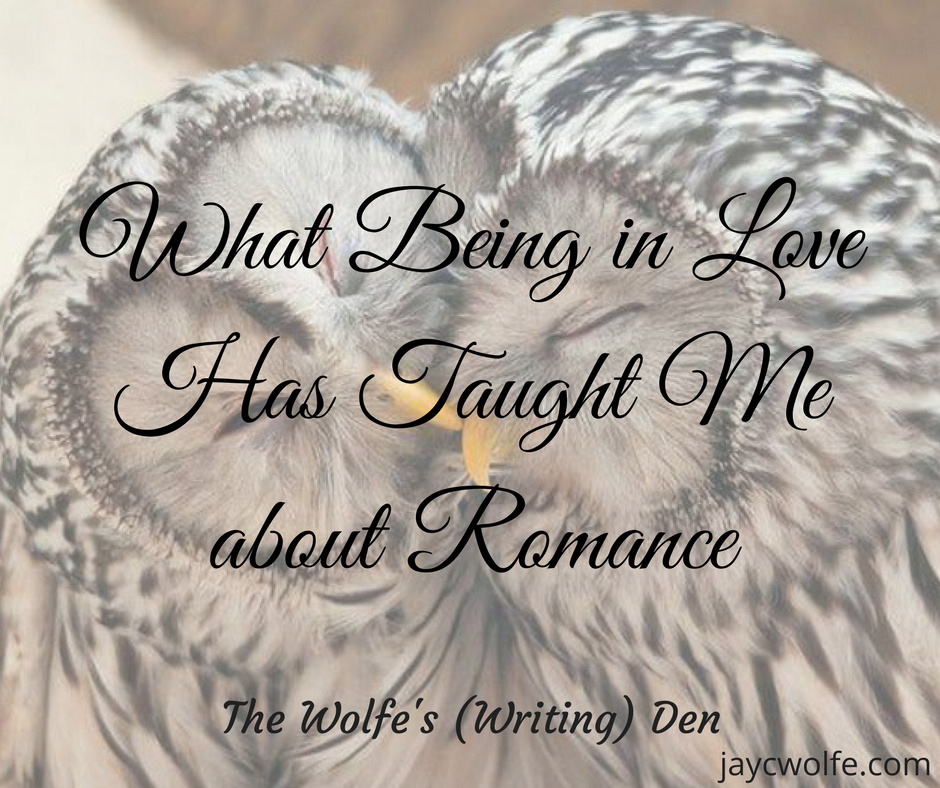
1) The greatest romance is with your best friend.
I know some guys still have a hard time believing this, so let me clear something up right now: there is no such thing as the “friend zone”! Trust me: this is coming from a woman who’s never dated a guy she didn’t consider a friend first. Just saying.
Now don’t get me wrong: I’m not saying you should always establish a friendship with someone before you start dating them. I’m just saying that when you do fall in love, it should be with someone you consider a true companion: someone who makes you laugh, who makes you feel safe, and who will always be there for you no matter what.
In other words, your best friend.
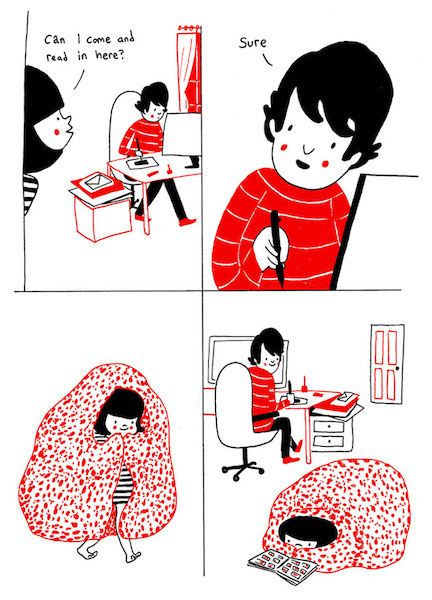
Me when my boyfriend is playing PC games while I’m writing
Illustration from the comic “Soppy” by Philippa Rice
I had the good fortune of falling in love with a man I already loved and trusted as a friend. This took a lot of pressure off the beginning of our relationship, and it’s only gotten better ever since! It’s no wonder so many of my fictional couples start out as close friends; it’s worked out so well in my real life!
2) True love isn’t in extravagant gifts and declarations; it’s in everyday words and gestures.
Any woman who grew up watching Disney princess movies from the 20th century probably reached adulthood with unrealistic expectations of men. After all, Disney princes are valiant heroes who give magic kisses and go to incredible lengths to rescue the women they love. Real-life guys can hardly compare, right?
But if there’s one thing I’ve learned from my current relationship, it’s that the so-called true love in fairy tales is very different from true love in real life.
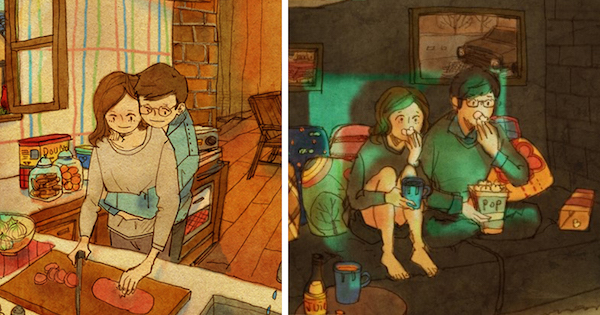
Love is in the little things
Illustrations by Puuung
I know beyond a doubt that my boyfriend loves me, but not because he showers me with gifts or writes me poetry that would rival Shakespeare’s. I can see it in the little things: the way he looks at me, the way he smiles at the sight of me when he comes home from work, the way he tells me I’m beautiful even when I’m wearing sweats and my hair is a mess, the way he knows exactly what to say or do to make me laugh.
In turn, I do my best to show him how much I love him in the same way: I compliment him every day, I constantly remind him how proud of him I am, and I do whatever I can to cheer him up when he has a bad day. Love is a two-way street!
Drawing inspiration from personal experience, I often add the same details to the relationships between my characters. True love means making each other happy, and in the long run, isn’t that much easier with small everyday gestures than with grand declarations of love?
3) You deserve someone who loves you just the way you are.
There are too many stories out there about girls who change everything about themselves just to please their guys, like Twilight or Grease or The Little Mermaid. Personally, I prefer the kind of story where the guy falls for the girl because she’s already everything he needs and vice versa.
I like to think my boyfriend and I found each other at the right time in our lives. I was in college and constantly feeling lonely and frustrated because I couldn’t seem to fit in with my classmates, while he wasn’t exactly at the highest point in his life either.
The initial connection we had and the relationship that followed have since found their way into some of the best romantic stories I’ve ever written. My favorite of these was about two young people who, despite being fine enough on their own, completed each other and made each other stronger. I didn’t have to look far for the inspiration behind that one!
There’s no better feeling than having someone who always supports your dreams and loves you just the way you are (besides your parents, of course). So if you love writing about love, I highly recommend experiencing it yourself. With a true romance in your life, you’ll never run out of inspiration!
What about you? What lessons have you learned about love in your lifetime? How have they inspired your writing?
by Naomi L. | February 9, 2018 | J.C. Wolfe's Writing, Poetry |
The year I’ve spent with you
Has been the greatest of my life,
A perfect, sweet reward
For our seven years of strife.
The distance was a trial
That year by year we passed,
But it was worth the wait
To be in your arms at last.
Nobody has the power
To make me laugh and smile
The way you always do
With your charming, witty style.
I love how much we share
And how much we think the same.
Forget expensive date nights;
Let’s just stay home and game!
You share in all my laughter
And hold me when I cry.
You make me feel so special
And don’t even have to try.
That’s all the proof I need
That our love is really true:
The year I’ve spent in Heaven
Living happily with you!
Happy Valentine’s Day to my loving boyfriend! Thank you for the most wonderful year of living together! I look forward to many more to come! I love you!
by Naomi L. | February 2, 2018 | J.C. Wolfe's Writing, Poetry |
I didn’t know
The world could be
So beautiful.
I didn’t know
There were so many colors
In the sky,
In the trees,
In the earth.
I didn’t know
Music is everywhere,
Life is poetry,
And magic is real.
I didn’t know
Distance is just a word,
That some forces
Are stronger
Than miles of empty space.
I didn’t know
Waiting could be so hard,
And yet so worth it
In the end.
I didn’t know
Anyone would wait
So many years
Just to be with me.
I didn’t know
I could be
So in love
And still fall deeper
Every day.
But then again,
There were many things
I didn’t know
Before I met you.
by Naomi L. | October 4, 2017 | Blog, Creative Writing |
It’s the first week of October, so regular readers of mine, you know the drill: it’s time to dive once again into my all-time favorite story, Romeo & Juliet! In the past, I’ve covered five points in the story that are often missed, the reasons it really is a great love story, a review of the book with both the play and the musical adaptation, and five lessons about love that can be learned from this story. Now I’m ready to cover even more of this timeless classic!
This year, I decided to dig a little deeper into the story and dedicate my annual R&J post to the literary devices that uphold it. So on that note, here are five major themes and motifs in Shakespeare’s Romeo & Juliet. Enjoy!
1) The Power of Love
But my true love is grown to such excess / I cannot sum up sum of half my wealth. – Juliet Capulet (2.6.33–34)
This one is kind of a given, but it’s such a prominent theme in Romeo & Juliet that it forever warrants a place at the top of the list. Though debates reign about the extent of the roles of fate, hatred, and violence in the play, it’s obvious that love is by far the most powerful force in this story. It brings the young lovers together, motivates them to risk everything to be together, and drives them to their tragic end. So let’s explore how powerful love really is in Romeo & Juliet, shall we?
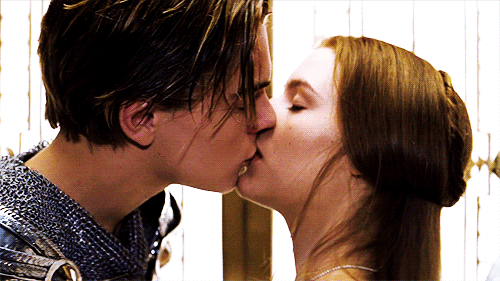
“Then have my lips the sin that they have took.” (1.5.110)
Romeo and Juliet share their first kiss (Romeo + Juliet, 1996)
To start, it’s important to define the type of love that dominates the play. There’s no question that the love in Romeo & Juliet is romantic, but what often gets overlooked is the fact that it’s also amoral. While other poets before him romanticized love as a beautiful and pure emotion, Shakespeare was more interested in portraying it as an intense and violent force that drives people into chaos and overpowers all other priorities, including life itself.
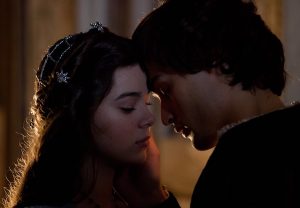
“You kiss by th’ book.” (1.5.112)
Romeo and Juliet find a moment of privacy at the Capulet Ball (Romeo & Juliet, 2013)
The greatest evidence of love’s intensity in Romeo & Juliet is the wide variety of descriptions and metaphors it receives throughout the play. In the sonnet that makes up Romeo and Juliet’s first conversation, love is described in religious terms, while in the prologue of Act II, the feeling is equated to magic. Its dangers are also mentioned by other characters: Friar Laurence warns Romeo about the fickleness of young love, while Mercutio’s Queen Mab speech outright criticizes the delusions of lovers’ dreams. Juliet even loves Romeo so much that she hardly has enough words to express her feelings all at once. Every character in the play seems to have an opinion on love, yet not one of them manages to describe it completely. It seems love, at least according to Shakespeare, is so powerful that it can’t be contained in any one definition.
Though the love in Romeo & Juliet is romantic, it’s far from idealized. Unlike the cheesy version in the bad poetry Romeo recites about Rosaline, Shakespeare’s depiction of love is a far more passionate and chaotic emotion that can evoke an astonishing amount of beauty and tragedy in a short period of time. No wonder this story is still so popular today; every time I read it, there’s something new to learn about love!
2) The Inevitability of Fate
A greater power than we can contradict / Hath thwarted our intents. – Friar Laurence (5.3.153–54)
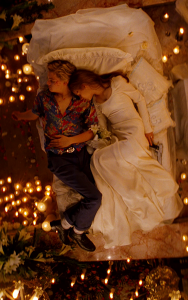
The star-crossed lovers meet their untimely end (Romeo + Juliet, 1996)
If love is the strongest theme in Romeo & Juliet, fate is a close second. From the opening lines of the chorus, it’s made clear to the audience that the young lovers are pretty much doomed from the start. While there is a solid argument that society is really to blame for Romeo and Juliet’s deaths, the fact that Shakespeare peppered his play with references to fate, fortune, and the stars hints at the idea that every circumstance leading up to the main characters’ tragic end was always out of their control.
Notably, the role of fate in this story isn’t just clear to the audience; it’s also evident to the characters themselves. Through the second half of the play, after Mercutio and Tybalt are killed, death always seems to linger in the corner of the lovers’ minds. They’re both haunted by omens—such as each other’s pale faces after spending the night together or Juliet’s vision of Tybalt’s ghost before taking the sleeping potion—and though they try to stave off the looming threat of tragedy, it soon becomes clear that their story can only end in their untimely deaths.
The inevitability of fate is emphasized by the many forms it takes throughout the play:
- The feud between the Capulets and Montagues, which is purposely never explained
- References to fate by the characters – “O, I am fortune’s fool!” (3.1.141), “Then I defy you, stars.” (5.1.24)
- Friar Laurence’s letter failing to reach Romeo
- Romeo dying just before Juliet wakes up
While fate often seems like an external and impersonal divine force driving the characters’ lives, it also manifests as the direct forces influencing Romeo and Juliet’s choices. The rivalry between the noble households culminates in the double murder that complicates the lovers’ marriage, and Capulet’s decision to change the day of the wedding contributes to the rush of events that leads to the final tragedy. Even the protagonists themselves play directly into the hands of fate. The irony of Romeo’s decision to die alongside Juliet is that by trying to defy fate, he inadvertently brings it about: Juliet kills herself as soon as she finds him dead, thus completing the tragic sequence of events set in motion from the play’s very first scene.
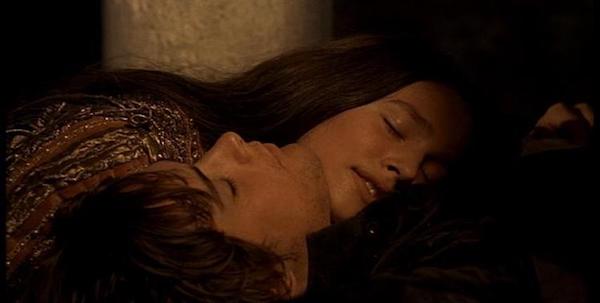
Juliet stabs herself with Romeo’s dagger and dies by his side (Romeo and Juliet, 1968)
Much like love, fate in Romeo & Juliet is an amoral and overpowering force that none of the characters can resist. Despite all their efforts to love each other in peace, Romeo and Juliet can never escape their tragic destiny as the “pair of star-crossed lovers” who “take their life”, immortalizing them as the ill-fated couple of one of the greatest love stories ever told.
3) The Duality of Passion (Love and Violence)
If the entire story of Romeo & Juliet could be summed up in one word, that word would be passion. Almost every scene in the play involves characters succumbing to powerful emotions that drive their actions and, consequently, the plot. Observe:
-
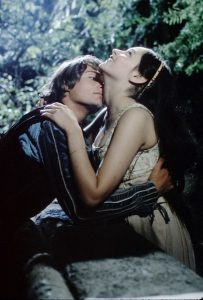
“My bounty is as boundless as the sea, / My love as deep; the more I give to thee, / The more I have, for both are infinite.” (2.2.133–35)
Act I: Montague and Capulet servants fight each other in the street (establishing the long-standing feud), Romeo agrees to attend the Capulet ball for the chance to see a girl he thinks he loves, Romeo and Juliet meet and fall in love at first sight
- Act II: Romeo risks death by trespassing into the Capulet orchard to see Juliet again, Romeo and Juliet declare their love for each other, Romeo proposes to Juliet the next day (via the Nurse), Romeo and Juliet get married
- Act III: Tybalt challenges Romeo to a duel for crashing the Capulet ball, Mercutio fights Tybalt to defend Romeo’s honor, Tybalt kills Mercutio, Romeo fights and kills Tybalt to avenge Mercutio, Romeo almost kills himself out of guilt, Romeo spends the night with Juliet, Capulet threatens to disown Juliet if she doesn’t marry Paris in two days
- Act IV: Juliet threatens to kill herself if Friar Laurence can’t help her get out of marrying Paris, Capulet gets so excited about Juliet becoming obedient that he moves the wedding up to tomorrow, Juliet drinks the sleeping potion Friar Laurence gives her to fake her death
- Act V: Romeo buys poison to kill himself after hearing that Juliet has died, Paris blocks Romeo from entering the Capulet tomb upon assuming he’s there to vandalize Juliet and Tybalt’s bodies, Romeo kills Paris outside the Capulet tomb, Romeo drinks the poison and dies beside Juliet, Juliet wakes up and stabs herself with Romeo’s dagger, Montague and Capulet reconcile over their children’s deaths
Notice how virtually every important action in this play is caused by some intense emotion, whether it’s overpowering love or violent hatred. What’s especially intriguing about the passion in Romeo & Juliet is that love and violence, however polar they may seem, are constantly intertwined. Indeed, the shadow of death hangs over the play’s characters from the prologue to the final scene, and it always manifests as a consequence of passion, as much in love as in hate.
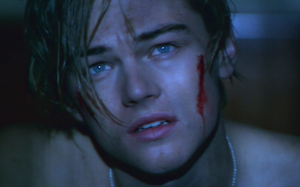
“Ha, banishment? Be merciful, say death.” (3.3.12)
The connection between love and violence in Romeo & Juliet is most evident in the actions and thoughts of the lovers themselves. Both Romeo and Juliet threaten to kill themselves at the first obstacle to their love, each one imagines the other looking dead the morning after their wedding night, and their intensely passionate “star-crossed love” culminates in their double suicide. While their goal is always to keep their love pure, the fact that they both resort to violence to achieve that end supports the story’s major theme of passion as a powerful and blinding force that few can resist.
By all accounts, passion seems to be the cause of all the conflict and grief in Romeo & Juliet. Then again, without passion, there would be no story in the first place, would there?
4) Light and Darkness
More light and light, more dark and dark our woes. – Romeo Montague (3.5.36)
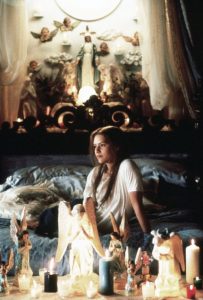
“Gallop apace, you fiery-footed steeds” (3.2.1)
A particularly prominent motif in Romeo & Juliet is the imagery of light and darkness. This motif manifests most frequently in night and day, as much of the action in the play happens either at night or in the morning. And while it doesn’t necessarily highlight any moral statement, the light and dark imagery of Romeo & Juliet does provide an interesting contrast throughout the story.
The most famous example of this imagery is during the balcony scene when Romeo describes Juliet as the sun, being so beautiful and radiant that she has the power to turn night into day. Another well-known example of this contrast is the morning after their wedding night, when the lovers playfully argue about the time of day before Romeo leaves for Mantua. These scenes highlight differing perspectives of the world and emphasize how Romeo and Juliet seek refuge in their love to oppose the reality that threatens to separate them.

“Wilt thou be gone? It is not yet near day.” (3.5.1)
Unlike many other stories that use this motif to symbolize good and evil, the light and darkness in Romeo & Juliet are far more neutral. The lovers favor darkness because it gives them the privacy they desire, yet they see only light in each other. And although it never plays a direct role in their story, the contrast of light and dark does permeate the play until it culminates in a final poetic union: the darkness of Romeo and Juliet’s deaths and the light of hope in their families’ reconciliation.
5) Individuality vs. Social Conformity
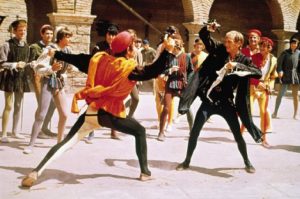
“Alla stoccata carries it away.” (3.1.77)
While love and fate pull most of the strings in Romeo & Juliet, the lives of the main characters are further complicated by the obstacles imposed by their society. Throughout the story, Romeo and Juliet struggle (with varying degrees of success) to defy the social institutions that oppose their love, such as:
- Family and patriarchy
- Religion
- Law and social order
- Masculine honor
Yet despite the challenges they face, the young lovers repeatedly prove that their love is stronger than the social norms that threaten to keep them apart. Juliet defies her father’s authority in order to marry the man she loves and remain loyal to him to the end. Romeo compares Juliet to the sun and considers her more beautiful than the goddess of the moon, while Juliet refers to Romeo as the “god of my idolatry” (2.2.114). While still banished, Romeo returns to Verona to see Juliet one last time before he dies. Romeo refuses Tybalt’s challenge for Juliet’s sake (though he later succumbs to the pressure of honor after Mercutio is killed).
By constantly rebelling against their world, Romeo and Juliet establish themselves as individuals who seek to distance themselves from the obligations their public social lives impose upon them. Yet despite their best efforts to rebel through individuality, these social institutions continue to force them further into a corner until they’re left with only one option for escape. If anything, the greatest tragedy of Romeo & Juliet is that as powerful and beautiful as their love is, they can only find peace from their poisonous society through the ultimate form of darkness and privacy: an eternity together in death.
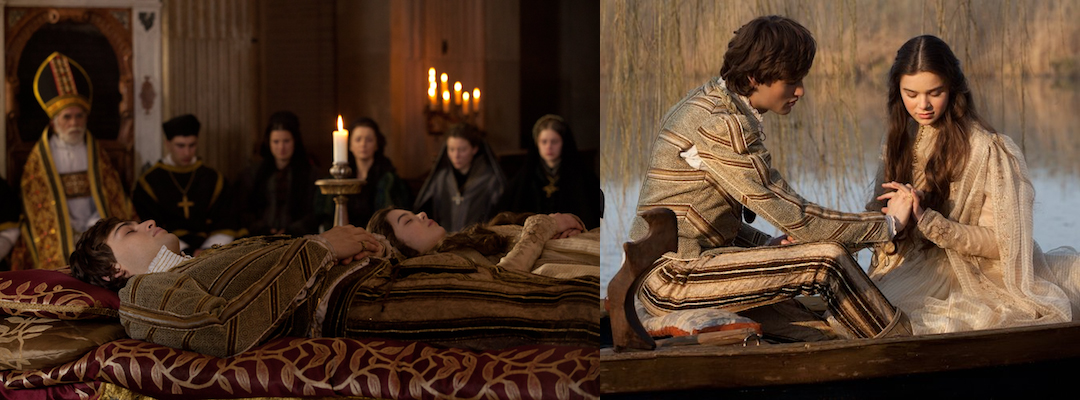
“For never was a story of more woe, / Than this of Juliet and her Romeo.” (5.3.309–10)
What are your thoughts on these themes and motifs in Romeo & Juliet? Any other interesting themes you would add to this list?




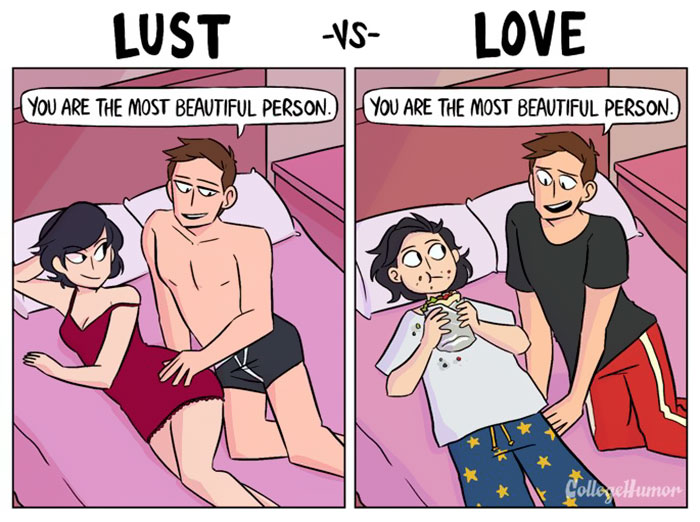











Recent Comments